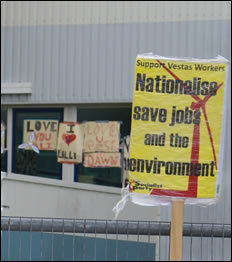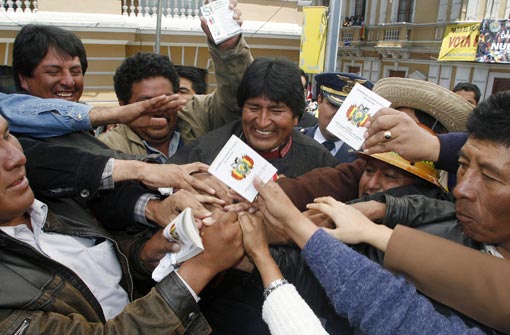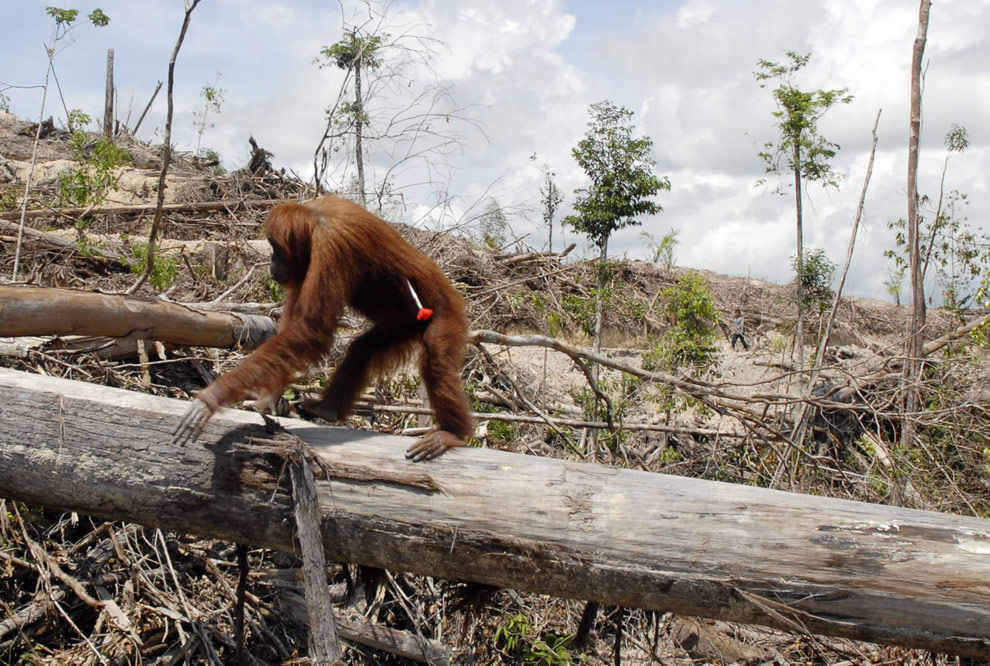environment

[For more background information, go to http://links.org.au/node/1168 and http://links.org.au/node/1175.]
Ventnor Blog -- August 5, 6pm, 2009 -- With Mike Godley having left yesterday, we spoke to Mark, one of the six who are still inside at the Vestas sit-in. We discussed how they had to reorganise themselves now four people have left.
He said that that morale was still good and how they’ll “still be fighting Vestas”. Mark explained that “It was strange to have that many people leaving at once.”
It’s unclear if Vestas have applied for bailiff papers to have them removed from the building. Vestas have issued a statement that they are very patient and that they can wait. Mark said, “They did ask us yesterday that if we wanted to leave the door open they would come in and get us. We replied ‘No’.”
Public ownership of coal industry needed to move to 100% renewable energy and retain jobs

For jobs and the environment: Why the workers occupied the Vestas wind turbine plant

Below is the text of a speech written by a Vestas worker for delivery at trade union and environmental movement meetings. It gives an excellent insight into the background of the struggle, and its wider political significance. It first appeared at http://savevestas.wordpress.com. See also ``Capitalism vs the environment: Wind turbine workers fight factory closure with sit-in'' for more coverage.
* * *
I’ve come today to speak about a little factory called St. Cross on the Isle of Wight – otherwise known as Vestas; you may have heard about it before …

July 29, 2009 -- For Pacific islanders, climate change is not a threat looming somewhere in the future. Rising sea levels and unpredictable weather are having devastating effects right now. Climate change has already forced some communities to leave their traditional homes.Simon Butler spoke to two climate change activists from the Pacific about their campaign for immediate cuts to global greenhouse emissions.
Pelenise Alofa Pilitati is the chairperson of the Church Education Directors' Association in Kiribati. Reverend Tafue Lusama is the chairperson of the Tuvalu Climate Action Network. They are on an Australian speaking tour through July and August, which is co-sponsored by Greenpeace and Oxfam. For details of the tour go to http://www.greenpeace.org/australia/news-and-events/events/pacificvoicestour-300609.
* * *
Simon Butler: What are you hoping to achieve with your speaking tour?
Raúl Prada Alcoreza: Analysis of Bolivia's New Political Constitution of the State

Bolivians celebrate their new constitution. President Evo Morales in centre.
The following article by Raúl Prada Alcoreza was originally published in the first issue (June 2008) of Crítica y Emancipación, a biannual Latin American journal of the social sciences. This translation from the Spanish, by Shana Yael Shubs and Ruth Felder, was published this year in a complete English-language version of the journal’s first issue. It was distributed at the recent congress of the Latin American Studies Association, held in Rio de Janeiro, Brazil, in June. A review of the first issue of Crítica y Emancipación was published at http://tinyurl.com/nuk4jp. This article also appeared at Bolivia Rising.
Australia: Global warming and the ‘Big Dry’— What prospects for the Murray-Darling river system?

By Renfrey Clarke
July 20, 2009 -- From desert-fringe villages and drowning atolls, global warming is predicted before long to set climate refugees on the move. But arguably, the first climate refugees to reach Australia’s major cities are arriving already. And the places from which they have come are not exotic — rural towns like Mildura, Renmark and Griffith in Australia’s south-east.
In settlements throughout the Murray-Darling, residents are quietly deciding the irrigation-based economy has no future. For many orchardists and viticulturalists, allocations of water in recent years have been too low to keep plantings alive.
When barely a trickle is coming down the rivers, farmers are concluding it’s best to sell the next-to-meaningless water rights, accept a government exit package, bulldoze the trees and vines, and walk away.
Unprecedented drought
Free downloads (PDF: requires Adobe Reader)
“Essential reading for everyone who is serious about confronting the climate emergency.” — Emma Murphy, co-editor, Green Left Weekly
Class struggle and ecology: An ecosocialist approach

By Socialist Resistance (Britain)
Can carbon trading save our forests?

By Susan Austin
June 26, 2009 – Hobart, Tasmania -- Along with over 400 other people, I turned up to the Wrest Point Casino here to attend the premiere of The Burning Season on June 1. I had the film’s headline -- “As inspiring as The Inconvenient Truth was frightening” in the back of my mind, hoping for a good news story. Instead I sat through a well-orchestrated promo for a carbon trading company, set up by a young Australian-based millionaire whose message was that it is possible to make money and save the environment at the same time.By setting up a carbon trading company called Carbon Conservation, and brokering high-level deals between big banks and provincial Indonesian governors, the film’s “star”, young entrepreneur Dorjee Sun, was able to secure the protection of large areas of forests that may otherwise have been logged or burnt.
Biofuels and sustainable transport -- Can biofuels be produced and used responsibly?

By Renfrey Clarke
June 16, 2009 -- For governments and vehicle corporations, the charm of biofuels used to be the promise they held out of a ready-made solution to transport-related greenhouse gas emissions -- a solution that might simply be dropped in, while changing almost nothing else. Freeways, suburban sprawl, four-wheel-drive family cars -- everything could remain. Only the fuel on sale at service stations would be different.
Biofuels, the promise to the public ran, would be ``clean and green’’, an environmental zero-sum. Although carbon was released to the atmosphere when biofuels were burnt, this was carbon that had been there earlier, before being taken up by the plants from which the fuels were derived.
Free downloads (PDF: requires Adobe Reader)
“Essential reading for everyone who is serious about confronting the climate emergency.” — Emma Murphy, co-editor, Green Left Weekly
